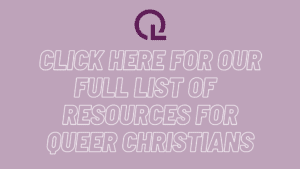
Imagine 12 strangers from across the country suddenly finding themselves in close quarters, sharing meals, and talking about sex. With such a small number of participants, it was as difficult to hide oneself as it was to demonize the others. Over a period of two days we listened to each others’ experiences of grief and comfort; we playfully exposed the stereotypes we held of each other and opened up avenues to appreciating our shared humanity. We began to see each other not as opposites or threats or judges, but as mutually vulnerable, well-intentioned, and, of course, imperfect brothers and sisters in Christ. The setting, activities, and expressed goals of the retreat created a sincere bond among us which, I believe, provided an indispensable foundation for our dialogue about faith and sexuality.
As we began to move past our initially perceived barriers to listen to each other, we found richness in our shared stories. We differed greatly in our religious experiences and their effects upon us, in our sexual orientations, our struggles, and our convictions. And during our brief time together, we grappled with a wide range of topics—from celibacy to non-monogamy, from the church’s abusiveness to its welcoming gestures; we discussed gay rights, gender identity, ecumenical differences, and much more. Learning about and navigating through these complex issues was no small task, but through our dialogue we gained opportunities to walk in each others’ shoes. And in those instances when it was difficult to find common ground, we were able to accept our differences. What made this dynamic hospitality possible were the relationships we were quickly building with each other—allowing each person to be honest, to ask questions without judgment and without demanding change from one another.
It’s important to note that the richness of this dialogue was also made possible by what was absent. The intentional lack of an “agenda” (it was very clear from the outset that our goal was not to change anyone’s mind, to convert, or to save others from their “errors”) and the fact that no final “product” was required to emerge from our discussions removed a lot of pressure from the participants. What’s more, there were no investments—that is, no one had any professional, personal, or financial ties that restricted him/her from honest and full participation. In my experience, such factors are often the chains that inhibit pastors, Christian educators, and institutions from creating truly open and safe spaces for discussing sexuality. In many contexts, the possibility for conversation is curtailed by the fear of consequences such as losing employment or losing funding. The absence of these influences made this retreat a much needed oasis among Christians communities.
I regret that we never got a chance to discuss transgender identity, an aspect that is no less imperative for Christian communities to address; nor did our group include any transgendered persons. However, the dialogue’s success lies in the model it offers, with the hope of carrying this conversation into other Christian communities. As most of us know all too well, discussions regarding the LGBQ presence in the church are frequently approached in more or less unhealthy ways. Oriented to Love showed me that the discussions about gay and lesbian sexuality and Christian faith are best had in small, hospitable groups with close bonds and no agenda. It’s my hope that this retreat won’t be the last of its kind but will continue in one form or another among Christians. And I hope that, even when we disagree profoundly, we can discuss sexuality and faith in spaces where our relationships allow us to be gracious with each other and with ourselves.
Julian Forth received his M.Div in 2009 from Duke Divinity School, has taught theology at Messiah College, and now works in housing rights and volunteers his time in peace activism. He currently lives in Washington, DC, and participates in various Christian worship communities.


